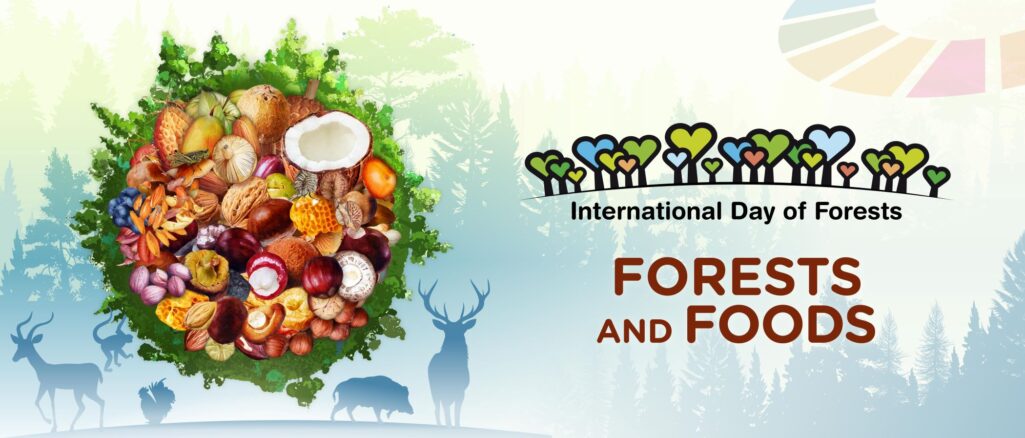The United Nations General Assembly proclaimed 21 March as the International Day of Forests in 2012 to celebrate and raise awareness of the importance of all types of forests. Each year, countries worldwide organize local, national, and international activities to highlight the role of forests, including tree-planting campaigns, educational initiatives, and policy dialogues. In 2025, the theme for the International Day of Forests is “Forests and Foods”, underscoring the indispensable roles forests play in food security, nutrition, and livelihoods.
Forests are more than just carbon sinks and biodiversity hotspots; they are key sources of sustenance, supporting billions of people worldwide. More than five billion people rely on forests and non-timber forest products, such as nuts, fruits, seeds, roots, mushrooms, honey, wild meat, and even insects, to enrich their diets with essential nutrients. Many communities, particularly Indigenous Peoples, depend on these resources not only for food but also for medicine and income. Additionally, forests provide crucial materials for cooking, as over two billion people worldwide rely on woodfuel and other traditional biomass for preparing food.
Beyond their direct contribution to food security, forests play a vital role in agriculture. They support farming by providing homes for pollinators, maintaining soil health, and regulating temperatures. By providing food and shade for livestock, acting as natural windbreaks, and influencing local rainfall patterns, forests make a significant contribution to sustainable food production. Moreover, in times of crisis—such as failed harvests, economic instability, or conflict—forests serve as essential food safety nets, providing alternative food sources that help sustain communities.
Forests also play a critical role in livelihoods, particularly in rural areas. In some regions, forests contribute around 20 percent of household income, allowing communities to afford nutritious food and diversify their diets. They also ensure water security, as forested watersheds supply freshwater to more than 85 percent of the world’s major cities. Sustainable forest management enhances water quality, benefiting over 1.7 billion people in large urban areas and contributing to overall food and water security.
One often overlooked contribution of forests is their role in supplying wild meat, an essential protein source for Indigenous Peoples and rural communities, particularly in tropical regions. More than 3,200 species of wild animals are used as food, providing critical micronutrients and sustaining local diets. The careful management of these resources ensures both biodiversity conservation and food availability for dependent populations.
YenKasa Africa’s Commitment to Forests and Livelihoods
As a communication platform supporting rural development, YenKasa Africa plays a vital role in raising awareness and fostering engagement in sustainable forest management. Through its articles and campaigns, YenKasa Africa highlights forests’ contributions to agroecology, rural livelihoods, and food systems.
- Promoting Community Voices: YenKasa Africa shares stories from farmers, Indigenous communities, and local organizations advocating for sustainable forestry practices. Radio remains a powerful tool for amplifying these voices, ensuring that rural communities have access to vital information on forest conservation and sustainable management. The radio programme The Importance of Village Banking for Forest and Farm Producers highlights how financial inclusion through village banking supports small-scale forest and farm producers, helping them invest in sustainable practices and secure their livelihoods.
- Facilitating Knowledge Sharing: The platform connects stakeholders through participatory communication efforts, ensuring that traditional knowledge and innovative solutions reach wider audiences. One example is From foliage to fortune: The empowerment of women in Zondoma through non-timber forest products, which showcases how women in Burkina Faso are using non-timber forest products to improve their economic situation while preserving local forests. This initiative demonstrates how knowledge-sharing networks and participatory communication play an essential role in ensuring that communities can benefit from forest resources sustainably.
- Encouraging Action: Through campaigns, webinars, and social media engagement, YenKasa Africa inspires individuals and organizations to take part in activities that support forest conservation and food security. The article Five trees for every child: Why Morungatuny, a community in Uganda is planting trees for the next generation tells the story of a community-driven initiative to reforest degraded landscapes, ensuring that future generations will continue to benefit from forests.
- Providing Rural Communication Services: Under the Forest and Farm Facility programme, YenKasa Africa supports six African countries—Kenya, Ghana, Tanzania, Togo, Madagascar, and Zambia—with tailored rural communication services, contributing to enhanced community engagement and capacity-building. These efforts help forest and farm producers access information, share their voices, and strengthen advocacy for sustainable land use through organized radio campaigns and participatory video.
For more stories, explore the YenKasa Africa’s website;
- Agroforestry – Trees for sustainable agriculture
- Green Revolution in Mali: The Triumph of Non-Timber Forest Products (NTFP) Management and Valorization by Women
- Planting trees in their own backyard
- Free farmland, for free trees
Previous Special Feature Article
International Day of Forests 2024 – Forests and Innovation: New Solutions for a Better World.

